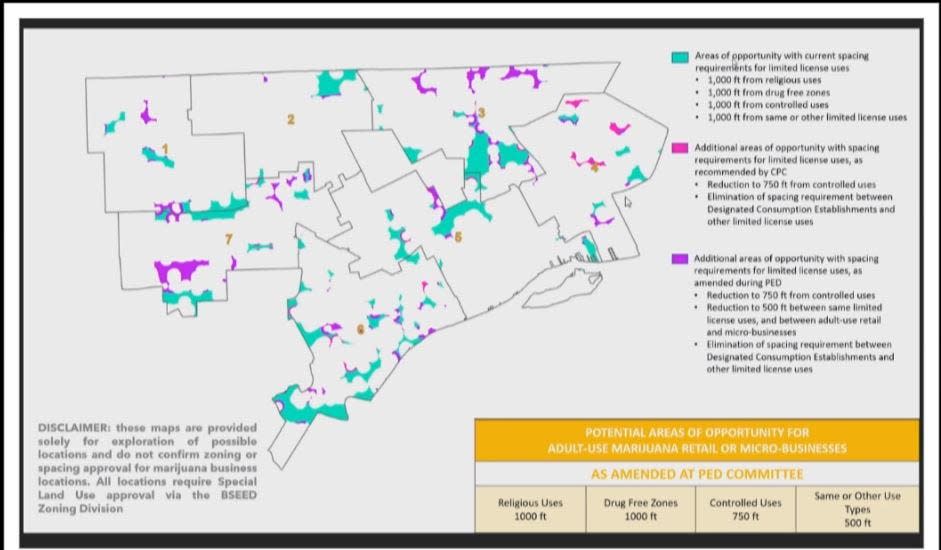Detroit City Council approves amendment that expands where cannabis businesses can locate
More properties in Detroit could soon be available for certain cannabis businesses to locate to after Detroit City Council on Tuesday approved an amendment to its recreational marijuana ordinance that reduces the spacing requirements between marijuana and certain other businesses.
The amendment reduces the distance cannabis retailers, microbusinesses and consumption lounges must be from "controlled uses" — like liquor stores — from 1,000 feet to 750 feet. The amendment also reduces the distance cannabis businesses are allowed to be from each other from 1,000 feet to 500 feet. It's not known when the amendment takes effect.
Council President Mary Sheffield, President Pro Tem James Tate and members Gabriela Santiago-Romero, Mary Waters, Coleman Young II and Fred Durhal III all voted yes. Council members Latisha Johnson, Angela Whitfield Calloway and Scott Benson voted against the amendment.

Tate, who has spearheaded efforts to allow recreational cannabis businesses in the city, called the amendment a "light touch but important touch for those who are seeking entryway into this industry in the city of Detroit, as well as those residents of the city of Detroit who do partake in this legal activity of cannabis use, and they prefer to take advantage of the stores and businesses within Detroit as opposed to going across the border and providing funds to another municipality."
The passing of this amendment comes as Detroit is preparing to accept applications for the second round of limited marijuana business licenses — which include dispensaries, microbusinesses and consumption lounges— a week from Tuesday.
Tate called these zoning changes for marijuana businesses one of his priorities in 2023 amid frustration from cannabis entrepreneurs that the zoning laws in the city resulted in few suitable properties on which these businesses could locate. Because there were so few options, that would then drive up the cost to open — through competition for those properties — and potentially result in entrepreneurs deciding to take their business elsewhere.
More on cannabis zoning challenges: Detroit marijuana industry faces tough zoning laws, leaves entrepreneurs with few options
This amendment will still require cannabis businesses to be at least 1,000 feet away from churches and "drug-free zones" like schools. Tate has said that a major reason why Detroit doesn't have cannabis businesses in the downtown area or in Eastern Market is because of the presence of churches.
At the council meeting, Young said he would like to have a conversation in the future about a way to allow cannabis businesses to open in downtown Detroit and in Eastern Market.
"I think we need to show the residents that we are serious about making sure that we're not having these in the neighborhoods — where they should not be and where they aren't in other major areas — and start having ... these businesses in the place where businesses should be at, which is the downtown general business district," Young said.
This amendment, while reducing the spacing requirements between certain cannabis businesses from each other and from liquor stores, also doesn't mean that the now-available properties will be purchased by cannabis companies or are even up for sale.
Benson, though, said he believes the amendment is going to "add to the proliferation of marijuana uses within my district."
"We do not have the availability for everybody who wants to get into the industry to get in," he said. "That's not a bad thing though."
Later in the meeting, Tate noted how litigious the cannabis industry is, and said the city has to "move in a way that does not create a target on our back for a lawsuit for us to lose and create even more of these establishments, which has happened in other cities."
Detroit faced multiple lawsuits against its attempts to create an ordinance that would allow recreational marijuana businesses in the city. After a federal judge denied a request in one of these lawsuits that would have halted the city's licensing process in December 2022, it paved the way for Detroit to award the first licenses for recreational marijuana dispensaries, consumption lounges and microbusinesses after a yearslong effort to do so.
There are now 28 recreational marijuana dispensaries open in Detroit, according to a map of dispensaries on the city of Detroit's website. No licenses were awarded in the first round for microbusinesses or consumption lounges.
Contact Adrienne Roberts: amroberts@freepress.com.
This article originally appeared on Detroit Free Press: Detroit approves amendment expanding sites for cannabis businesses

